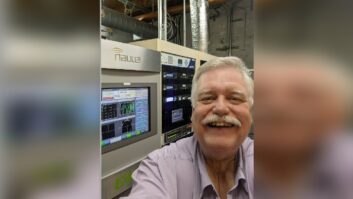Deaf and hard-of-hearing people enthusiastically experienced the NPR Labs/Towson University/Harris live captioned radio demo using the data capabilities of IBOC on election night.
I spent Tuesday evening at Towson University, home to WTMD(FM), Towson, Md. The station was one of five broadcast organizations participating in the demo, along with NPR in Washington, WGBH Boston, Colorado Public Radio in Denver and KJZZ in Phoenix.
At all of the events, participants saw scrolling text projected onto a large display screen. The image was fed by an HD Radio reference receiver that can decode captioned text included in the data portion of the IBOC transmission. The reference receiver was hooked up to a computer and monitor. The demo was intended to show that live captioning is possible.
To create the caption display, NPR sent audio of its election programming over a phone line to WGBH, where stenographers quickly transcribed the material using headphones and special keyboards; WGBH sent a transcription back to NPR over the phone line so that NPR could uplink the feed to participating stations via satellite. The captioned audio was also streamed over the Web.
Several of the Deaf and hard-of-hearing participants with whom I spoke at the Towson event had traveled several states to see the demo and said they have been anticipating captioned radio eagerly. Such capability would make radio easier to use, and the emergency alert component of the project is vital, they told me. Examples of the latter would be displaying an alert caption and, someday, enabling the radio itself to trigger a strobe light or a bed shaker in the event of an emergency.
Deaf and hard-of-hearing people can’t benefit from traffic reports on the car radio, one participant reminded me, and they may often be unaware of alternate routes around an accident. Captioned radio “would limit my dependence on other people,” said a participant from the Baltimore area.
NPR’s Mike Starling tells me NPR is targeting late 2009 to have its main program captioned; however, the timing depends on finding underwriting to contribute towards the cost of generating the captions, and finding receiver manufacturers to make the HD Radios capable of decoding and buffering the caption data.









